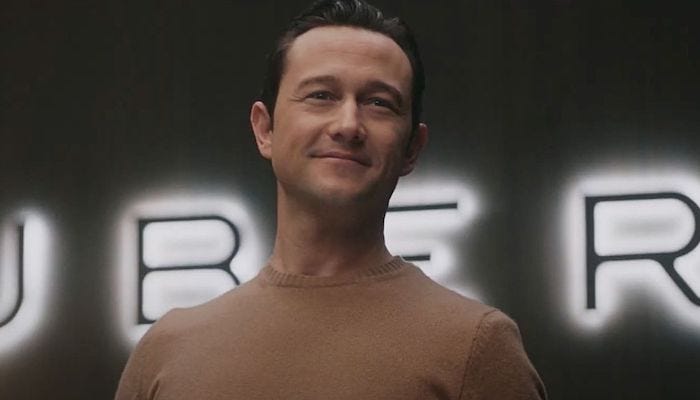Founder Fever: Breaking Down 'The Dropout,' 'Super Pumped' and 'WeCrashed'
Three new shows about the rise and fall of start-up visionaries reveal the insidious power of confidence. And open offices.
In a three-week period, three different shows about the rise and fall of tech startup visionaries have launched, as if summoned into existence by some charismatic messiah-figure who believed that everyone in America was me— a viewer who will devour them like so many billions of dollars in venture capital. The first question that compels me, in every case, is a simple, incredulous “How?”: How did investors believe that Elizabeth Holmes, the founder of Theranos and the subject of Hulu’s The Dropout, could get accurate medical testing from a single drop of blood? How did they believe Adam Neumann, the founder of WeWork and the subject of Apple TV+’s WeCrashed, could turn rented desks into a revolution of generational scope? How did they believe that Travis Kalanick, the CEO of Uber and the subject of Showtime’s Super Pumped, had the experience and good judgment to upend an entire sector of the transportation industry?
These are mostly rhetorical questions, because they all have the same answer: confidence. In profoundly destabilizing times such as ours, con men (and women) fill the vacuum, and the tech world is particularly fertile ground. If Steve Jobs can put 1,000 songs in your pocket, the thinking goes, then a miracle like 30 comprehensive lab tests can be performed on a pinprick, right? The bigger and more impossible the vision, the better, because the promise of a transformative business is so much more valuable than a modest, sustainable one. It means the con can continue, despite the ever-widening chasm that opens up between the company’s valuation and what it’s actually worth. To quote Matthew McConaghey’s broker as he gives advice to Leonardo DiCaprio’s young charge in The Wolf of Wall Street, “Keep the clients on the ferris wheel. And the park is open 24 hours, 3-6-5, every decade, every goddamn century.”
The Reveal is a reader-supported newsletter dedicated to bringing you great essays, reviews and conversation about movies (and a little TV). While both free and paid subscriptions are available, please consider a paid subscription to support our long-term sustainability.
Before breaking down these fictionalized founders (and their shows) individually, here are a few more things they have in common:
• Dupes. Holmes, Neumann, and Kalanick are all a generation or two younger than their chief investors, who are mainly boomers who want to stay relevant and can feel the earth trembling under their feet but don’t know the business enough to sniff out a scam. They’re eager to pour money into a tech startup, but also likely to make phone calls to tech support. The one exception is Bill Gurley (Kyle Chandler) in Super Pumped, a general partner from a respected Silicon Valley venture capital firm, but his misgivings about Kalanick’s reckless decision-making become a reason for Kalanick to seek out real dupes—the types with deep pockets who don’t ask questions. Or are at least too prideful to avoid chasing good money after bad.
• Infinite growth. Every one of these businesses insists it has the potential to be the next Amazon—once an online bookstore, now an omnipresent everything store. Proprietary machines that can run 30 labs on a single drop of blood are themselves but a single drop of blood in a Theranos-led takeover of the medical industry by Big Tech. WeWork isn’t a New York-based real estate outfit that rents desks in sublet office spaces, but a pseudo-spiritual cult that applies its core concepts to living spaces and schools and physical fitness centers. Uber doesn’t aspire merely to disrupt the cab and livery business through an app-based driving service, but works toward a future where drivers themselves may not even be necessary. And the growth must be explosive, not gradual.
• Open offices. During my last months at The A.V. Club in 2013, the powers-that-be at Onion Inc. embraced the open office concept and moved everyone to the expansive, borderless fifth floor of a building a block away from the previous office. Instead of closed offices, cubicles and/or some team-based combination of the two, employees were seated at long tables that stretched from one end of the office to another, with section heads at the end, like dad at dinnertime. No call or conversation could happen without others hearing, and even meetings were fishbowls within eye- (and sometime ear-) shot. Imagine a monastery if the monks were paranoid, miserable, and shit-talking about each other over IM.
The open office was most emphatically not an egalitarian space where employees can exchange ideas and create a community together. All three shows seize on the open office plan beautifully: Theranos feels like an open space when, in reality, it silos teams into areas where they deliberately cannot share ideas, in order to maintain the testing flimflammery the company was running in lieu of its technology actually working. WeWork is literally built around the office-community concept, with its casual coffee and beer bars, but Neumann allows himself to be the exception. And in the latest episode of Super Pumped, women are shown registering sexual harassment complaints in full view of their harassers, who can continue to intimidate just by looming outside the glass.
Our visionaries, one by one:
The Dropout (Hulu)
Founder/company: Elizabeth Holmes (Amanda Seyfried), Theranos
Idea: To conduct dozens of lab tests from a single drop of blood.
Viability rating: 0. It turns out you need more than a drop of blood to conduct blood tests. Who could have known that?! (Scientists.) So in order to keep that investor money flowing while waiting on a miraculous breakthrough, Holmes pursued a fake-it-’til-you-make-it strategy that led to a criminal fraud conviction.
High-profile dupes: Larry Ellison, Rupert Murdoch, Betsy DeVos, the Walton family, George Shultz.
Quirks: Dresses like Steve Jobs. Speaks in a weird, affected “deep” voice. Listens to the Alabama song “I’m in a Hurry (And Don’t Know Why)” on repeat, tidily reflecting her relentless, empty ambition.
Red flags: None of the company’s proprietary machines work. Investors are mostly treated with delays or smoke-and-mirrors demonstrations. Holmes’ COO/secret boyfriend, “Sunny” Bulwani (Naveen Andrews), oversees a work environment defined by paranoia and hostility, with employees siloed off by secret rooms and NDAs.
Quality of the series: Based on the ABC podcast of the same name, The Dropout is the strongest of the three shows, starting with its treatment of an eccentric dreamer whose ambition put her on the slippery slope to being a scam artist. The trick of the show—and Seyfried’s excellent lead performance—is to give Holmes dimensionality and vulnerability without papering over her active participation in a dangerous fraud. At every step, she wants to keep this impossible dream alive, and the small lies necessary to keep it going grow bigger and more pernicious, enabled by board members who like her story more than they care to scrutinize her actions. The Dropout indicts many people besides Holmes, and does it with humor, well-sketched characters, and a blessed economy that carries over from the podcast.
Super Pumped (Showtime)
Founder/company: Travis Kalanick (Joseph Gordon-Levitt), Uber.
Idea: Disrupt the cab industry through an app-based “ride-sharing” service.
Viability rating: 9. Though billions have been lost in the road to profitability, it cannot be denied that Uber has upended an entire sector of the transportation business and continues to expand into multiple delivery and rental businesses.
High-profile dupes: None. It was a wild ride, to say the least, but Bill Gurley (Kyle Chandler), Google Ventures, Arianna Huffington (Uma Thurman), and other early investors and board members made a fortune off the company.
Quirks: An alpha-male psychosis that’s somewhere between the Jordan Belfort of The Wolf of Wall Street and Patrick Bateman in American Psycho. An expectation of approbation and applause from his minions, even if he has to throw multi-million dollar company bacchanals to get it. Not great with women.
Red flags: A reckless disregard for user privacy. A reckless disregard for driver safety and compensation. A reckless disregard for even the most basic protections and procedures on sexual harassment and misconduct within the company. A breathtaking arrogance. A poor composer of emails.
Quality of the series: Working from Mike Isaac’s book, creators Brian Koppelman and David Levien turn Kalanick’s rise and fall into a companion of sorts to their long-running show Billions, folding Kalanick into a specific class of Darwinian capitalists who pursue wealth and power without any ethical (or moral or legal) obstacles getting in their way. Super Pumped cannot be like The Dropout because Koppelman and Levien aren’t interested in Kalanick’s humanity, such as it is, but in the whole phenomenon of Silicon Valley startup, a gold rush that encourages/enables creatures like Kalanick to scale up as fast as they burn out. He’s an uncomfortable person to be around—and the energy of the show, typified by Quentin Tarantino’s narration, can be a bit much—but Super Pumped nails him as the tech equivalent to an early 20th century industrial baron.
WeCrashed (Apple TV+)
Founder/company: Adam Neumann (Jared Leto), WeWork.
Idea: Renting desks.
Viability rating: 4. Neumann and his co-founder, Miguel McKelvey (Kyle Marvin), were probably correct in understanding that the nature of work and workspaces is changing for the younger generations, and the urgency of greater flexibility. But the vast oceans of borrowed money necessary to buy and sublet real estate in New York and other major cities made profitability, much less sustainability, a distant dream.
High-profile dupes: Masayoshi Son, Jamie Dimon, Mohammed bin Salman.
Quirks: An entrepreneurial résumé that includes kneepads on baby clothes. A tendency to go barefoot in public appearances. A speaking voice that’s part Tommy Wiseau, part televangelist, and all TED talk.
Red flags: Promoting the founder’s wife Rebekah (Anne Hathaway), a never-was actress and yoga instructor, to a top position in the company. Blowing great gobs of money on parties and cult-like summer camps, along with egregious personal expenditures. Cashing out $700 million from the company ahead of a disastrous IPO.
Quality of the series: As with The Dropout, WeCrashed adapts a podcast of the same name, this one on the Wondery network, and it wisely emphasizes the absurdity of the company’s growth, particularly under an enigmatic founder who never for a moment seems capable of managing a business. But Leto’s typically distracting performance turns Neumann into an alien presence, a problem deepened by Hathaway’s Rebekah, whose shameless name-dropping and Buddhist philosophizing should make her an easier comedic target. The show does well to account for the peculiar inner workings of an outfit that defines itself as a tech company, but is actually a gussied-up real estate company. But without an actor to approximate the real-life Neumann’s seductive, messianic charisma, WeCrashed is missing its anchor.









Love pieces like this-- and you've convinced my wife to start "The Dropout"!
The New Yorker had a great breakdown of Neumann and WeWork. One of their most interesting insights was that the early VC investors in WeWork *did* make money off of it, because they were able to hype it and pass it along to the next group. It creates a grotesque marketplace where it's not about finding the most viable long term company but finding something (or someone) that can generate the most buzz.